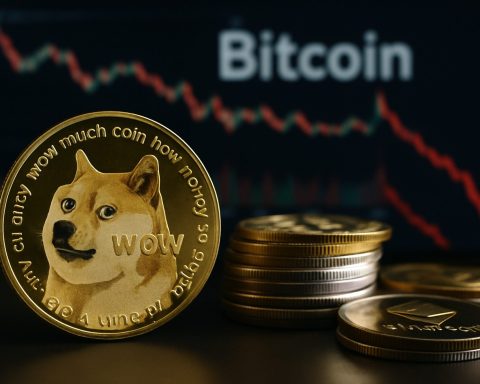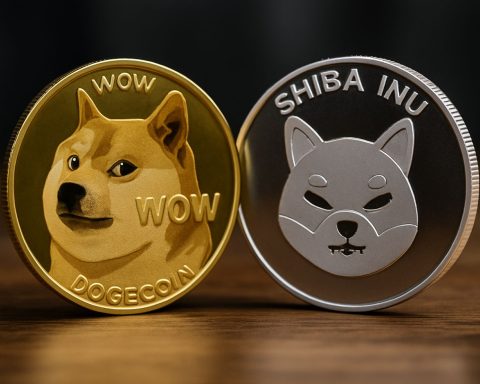- China’s tech giants, including ByteDance, Alibaba, and Tencent, are heavily investing in NVIDIA’s H20 AI accelerators, with orders surpassing $16 billion.
- NVIDIA’s H20, a specialized variant for the Chinese market, is in high demand despite U.S. export restrictions on AI technology.
- The drive for advanced AI models like DeepSeek R1 and V2 amplifies the need for NVIDIA’s powerful computing resources.
- Supply chain bottlenecks and production delays of up to six months are anticipated.
- Potential U.S. export bans pose a threat to NVIDIA’s revenue streams and China’s AI strategy.
- The situation illustrates the interplay of ambition, innovation, and geopolitics in the global tech landscape.
A seismic wave ripples through the tech world as China’s grand appetite for NVIDIA’s H20 AI accelerators reshapes the market landscape. These renowned pieces of hardware, designed under challenging geopolitical constraints, have garnered immense desirability among China’s tech giants. Despite the U.S. export restrictions limiting access to top-tier AI technology, the H20, a specialized variant tailored for China, is captivating titans like ByteDance, Alibaba, and Tencent. Reports indicate that their orders exceed a staggering $16 billion—a testament to NVIDIA’s magnetic pull in the Chinese AI marketplace.
The fervor is partly fueled by an ongoing battle of AI supremacy within Chinese tech firms. Models such as DeepSeek R1 and V2 have intensified the drive for powerful computing resources, turning NVIDIA’s H20 into a coveted commodity. This feverish demand sparks a ripple effect, bottlenecking the supply chain and prompting NVIDIA to predict delivery delays extending up to six months. With Taiwan Semiconductor Manufacturing Company (TSMC) focused on NVIDIA’s cutting-edge architectural ventures like Blackwell Ultra, production strains grow sharper.
In the depths of this technological quest lies an upgraded H20 AI accelerator, tantalizingly equipped with what is likely HBM3E technology. Such advancements propel demand even higher, igniting a sense of urgency among Chinese firms. Still, an imminent specter looms over the alliance—potential U.S. export bans could abruptly halt this golden production line, delivering a severe blow to NVIDIA’s revenue streams from the region and casting uncertainty over China’s AI strategy.
This tale of high-stakes procurement underscores an electrifying takeaway: the relentless pursuit of innovation thrives even within political and logistical hurdles. It provides a vivid snapshot of how ambition, ingenuity, and geopolitics intermingle on the global tech stage. For now, China’s tech giants continue to devour NVIDIA’s meticulously crafted accelerators, eager to harness their potential and vault into the future with unmatched AI prowess.
Why China’s Obsession with NVIDIA’s H20 AI Accelerators Could Change the Tech Game Forever
The Growing Demand for AI Powerhouses
NVIDIA’s H20 AI accelerators have become more than just high-performance hardware; they represent a critical component in China’s expansive AI strategy. Designed specifically as a geopolitically savvy variant of NVIDIA’s high-end tech, the H20 offers a glimpse into how targeted technological solutions can navigate and even thrive amid international trade restrictions.
Why the H20 is Crucial for Chinese Tech Giants
Advanced AI Capabilities
The H20 is rumored to include advanced features likely derived from HBM3E technology, which ensures rapid data processing and immense power efficiency—key elements for AI models that require substantial computational inputs.
Geopolitical Strategy
By crafting a specialized variant tailored to meet export restrictions, NVIDIA addresses a massive market without running afoul of U.S. export policies. The H20 strikes a balance, allowing Chinese companies to remain competitive in the global AI arena.
Industry Trends and Market Forecasts
The insatiable demand for the H20 AI accelerator highlights several trends in the tech industry:
– Rising AI Investment: With orders surpassing $16 billion, it’s evident that AI continues to be a leading investment area for tech companies, particularly in China.
– Supply Chain Bottlenecks: The high demand has led to predicted delivery delays of up to six months, indicating that the supply chain, despite being robust, faces significant strain under such massive demand.
– Innovative Semiconductor Manufacturing: Companies like TSMC are simultaneously tasked with fulfilling current orders and innovating for the future, evident from their work on the prospective Blackwell Ultra architecture.
Real-World Use Cases
Chinese firms like ByteDance, Alibaba, and Tencent can utilize NVIDIA’s H20 accelerators for:
– Enhancing Social Media Algorithms: ByteDance can improve content delivery speed and accuracy.
– Cloud Computing Solutions: Alibaba’s cloud services can gain significant boosts in capability and efficiency.
– Gaming and Virtual Reality: Tencent, a giant in the gaming industry, can develop more sophisticated AI-driven environments, enhancing user engagement.
Pros & Cons Overview
Pros:
– High Efficiency and Performance: Delivers superior computational power thanks to cutting-edge technology.
– Geopolitically Compliant: Tailored to navigate U.S. export restrictions effectively.
Cons:
– Potential for Export Ban: A looming risk of further U.S. government intervention could disrupt supply.
– Production Delays: Intense demand has clogged production schedules, delaying deliveries for up to six months.
Controversies and Limitations
The burgeoning success of NVIDIA’s H20 in China also raises several controversies:
– Ethical Concerns: As AI becomes more central to technology, ethical scrutiny over its applications—especially for surveillance and data analytics—increases.
– National Security: The U.S. may perceive the widespread adoption of advanced AI technologies in China as a challenge to geopolitical stability.
Insights & Predictions
– Scarcity Could Drive Innovation: As supply chain restrictions delay product delivery, companies might be motivated to develop their own solutions or alternatives to mitigate reliance on foreign technology.
– Adaptive Strategies: Companies worldwide may follow NVIDIA’s approach, crafting region-specific technologies to penetrate restricted markets effectively.
Actionable Recommendations
For companies seeking to leverage or adapt similar strategies:
– Diversify Supply Chains: Establish multiple production and supply chain avenues to mitigate potential geopolitical and logistic impediments.
– Invest in Local R&D: Consider investing in regional research and development to create tailored solutions fitting specific market constraints.
For further insights into technology and innovation trends, visit NVIDIA.
In conclusion, NVIDIA’s tailored approach with the H20 AI accelerators has not only met China’s growing demand but also offered a strategic pathway for companies facing global trade challenges. Meanwhile, companies must continue to innovate, collaborate, and remain adaptable to ensure prolonged success and relevance in an ever-evolving tech landscape.






